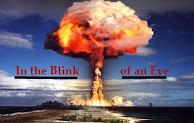The church has been instituted among men by God to serve a divine purpose of calling individuals together in community to worship, but also to unite as a bulwark of righteousness and truth in a world full of evil. The church in Hitler's day saw him rising to power, but didn't say a thing. They didn't speak out. Instead, they were more concerned about whether or not they should allow the Jews to belong in the church at all.
In Dietrich Bonhoeffer's biography, succinctly put: "The German church was in turmoil. Some church leaders felt the church should make peace with the Nazis, who were strongly opposed to communism and 'godlessness.' They believed the church should conform to the Nazi racial laws and the Fuhrer Principle."
The year is 1933. No one in the world saw Hitler leading to the slaughter of 6 million innocent Jews and an attempt to take over the world. Yet, there were warning signs for the attentive observer. The preaching of the 'Fuhrer' principle by Nazi leadership, boycotts all through 1933 by Nazi leadership of Jewish communities and businesses, the midnight 'clensing' via the burning of western books and literature, and the takeover of the press by the Nazi's were just a few examples. Signs were everywhere in 1933. The rise to power by the Nazi party may have been swift, but not swift enough for someone looking to miss the smoke before the fire began.
The rise of power in the state was happening, yet the church was nowhere to be found. Many didn't want to speak out for fear or reprisal. Some thought that the state could bring the church together, as after all, Hilter and co were using Christian overtones in many of their speeches.
Bonhoeffer wrote a call to action for the church and in it defined the major three roles of the church as follows in relation to the state:
1. The church must question the state
2. The church must help the state's victims
3. The church must work against the state if necessary to protect its existence
This call to action ultimately rang on deft ears and proved too much for anyone to swallow.
Should the state anywhere, anytime rise to a level of power that infringes upon the rights of the people, let us learn a lesson from history and take a stand. The church is the bulwark to defend the world from tyranny and proclaim the freedom that comes from knowing Christ.
This guy gets it. The church should take notice. Part of tonight's State of the Union rebuttal speech by Paul Ryan is below:
ROLE OF GOVERNMENT: “We believe government’s role is both vital and limited – to defend the nation from attack and provide for the common defense … to secure our borders… to protect innocent life… to uphold our laws and Constitutional rights … to ensure domestic tranquility and equal opportunity … and to help provide a safety net for those who cannot provide for themselves. We believe that the government has an important role to create the conditions that promote entrepreneurship, upward mobility, and individual responsibility. We believe, as our founders did, that ‘the pursuit of happiness’ depends upon individual liberty; and individual liberty requires limited government. Limited government also means effective government. When government takes on too many tasks, it usually doesn’t do any of them very well. It’s no coincidence that trust in government is at an all-time low now that the size of government is at an all-time high.”








No comments:
Post a Comment